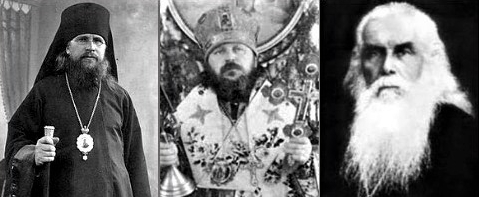 |
| St. Seraphim of Uglich (left), St. Victor of Glazov (center), St. Cyril of Kazan (right) |
"In 1933, Bishop Victor Ostrovidov, who was heading for exile in Pechera, arrived in Archangelsk, who also took part in performing illegal Services. At the same time, arriving in exile was Bishop Seraphim Samoilovitch.
With the arrival of Bishop Victor in Archangelsk many of the exiled Vyatka clergy began to visit him, I do not remember the names of all of them, but they went to him. I do remember the following however: Father Paul, two Priests named Nicholas, Deacon Athanasius Kasianov and Priest Alexander Kokarnikov. Bishop Victor stayed with us for 2 weeks, and then left for Pechera. All of the clergy known to him: Fr. Paul, the 2 Nicholas’s, Athanasius and Alexander, continued to visit our apartment and took part in the conversations and Church services held there. After Bishop Victor's departure, my father maintained contact with him through correspondence."
In answer to the investigator’s question about witnessing secret ordinations, the accused stated: “I know of only one instance in 1934, when Bishop Seraphim ordained an administratively-exiled Alexander Yakovlevich Jacobsen, and apparently supplied him with an Antimins, because thereafter Jacobsen conducted Services in his own house. Apart from this, I know of one instance when Bishop Seraphim elevated Deacon Athanasius to Protodeacon”.
From K.N. Piskanovsk’s testimony, we learn new details about the reciprocal relationships between Metropolitan Cyril (Smirnov), Archbishop Seraphim (Samoilovitch), and Bishop Victor (Ostrovidov) on the one hand, and Metropolitan Sergius (Stragorodsky) – on the other.
"Gathering in our apartment, all these persons not only held divine services, but also often talked about Church issues. In particular, talks were held about the necessity to write to Sergius - prohibiting him from conducting Church Services and removing him as head of the Church. The main initiator of these talks was Bishop Victor, who regarded that Metropolitan Sergius published an erroneous “Declaration” and had also illegally seized authority. My father, Bishop Seraphim and Jacobsen concurred with Bishop Victor’s opinions. It was therefore decided to send Metropolitan Sergius an interdiction... Approximately 3 months after his departure, Bishop Victor sent my father his interdiction written to Metropolitan Sergius. This ban was discussed by my father and Bishop Seraphim, after which Bishop Seraphim added his interdiction.
In May of 1934, at the suggestion of my father and Bishop Seraphim, I carried the interdictions of Bishops Victor and Seraphim to Metropolitan Cyril in Gzhatsk, near Moscow. Metropolitan Cyril had to examine these texts and sign or write his own interdiction. As well, my father gave me a letter to Metropolitan Cyril, which apparently fully explained the reasons for the issuing of these interdictions. Having fully read the texts of Victor’s and Seraphim’s interdictions, he didn’t sign any of them stating that he found them too sharp and that he will write his own, separate interdiction. Cyril then gave me a letter to Bishop Seraphim, in which - as far as I know - he explains his reason for not signing their interdictions. In the autumn of 1934, Seraphim sent his, along with Victor’s interdictions by mail. As far as I know, Cyril likewise sent his interdiction to Sergius.
It was known that Bishop Victor (Ostrovidov) was against the Ecclesiastical course taken by Metropolitan Sergius (Stragorodsky) and his Synod. Thus, at his last interrogation, his concluding words on the 22nd of December 1932 were: “As a follower of Patriarch Tikhon and according to my religious beliefs, I don’t recognize Sergianism and Renovationism”. In his address on the 23rd of February 1934 to Yekaterina Pavlovna Peshkov - who headed the Pompolit, he wrote about the review of his case: “The last time that I was found guilty was in May of 1928, and I was sentenced to three years in a labour camp for refusing to acknowledge the prominent “Declaration” of Metropolitan Sergius, and also refusing to recognize him as the head of the Orthodox Church”. Vladyka Viktor, according to his appeal to Pompolit, was held for 8 months, in isolation, in a pre-trial detention center in the city of Syktyvkar. That’s why he arrived at Archangelsk in August, returning to the shores of Pechora.
Archbishop Seraphim (Samoilovitch) was in complete unanimity with Bishop Victor. It can be seen that the hierarch placed his [Bishops Victor's] “Appeal” as the basis of his text - but in the administration of the Russian Church after Metropolitan Peter (Polyansky) he appointed Metropolitan Cyril (Smirnov), without directly mentioning the latter. The conversations of the exiled clergy in Arkhangelsk were shown by K. N. Piskanovskaya.
There is information on either the holding of meetings with the participation of Bishops, or in the preparation for such meetings. “For example, on the 12th of May 1937, the former Abbot of the Danilov Monastery Archimandrite Simeon (Holmogorov) gave the following testimony (in accordance with the Protocols):
“While being exiled in Archangelsk in 1934, Archbishop Seraphim held illegal conferences with several exiled Bishops in whose name an appeal was compiled, calling for the unification and decisive counter-revolutionary actions in the bloc with all opposition clergy. This was disclosed by Bishop Athanasius (Sakharov) in a conversation with me in the town of Vladimir in September 1935. Archbishop Theodore (Pozdevsky) also wrote to me on this matter at the end of 1935: “I don’t know who participated at this illegal conference as nobody said or wrote about it to me”. On the 1st of June 1937, (again in accordance with the Protocols), Archbishop Theodore clarified this matter by declaring the following: “I indeed informed Holmogorov that Archbishop Seraphim of Uglich wrote an “Epistle”, which banned Metropolitan Sergius from performing Church Services. I don’t know whether this “Epistle” was sanctioned by any of the exiled Bishops. I was informed of this “Epistle” by Hieromonk Spyridon Punovsky in 1935 while being exiled in Archangelsk”.